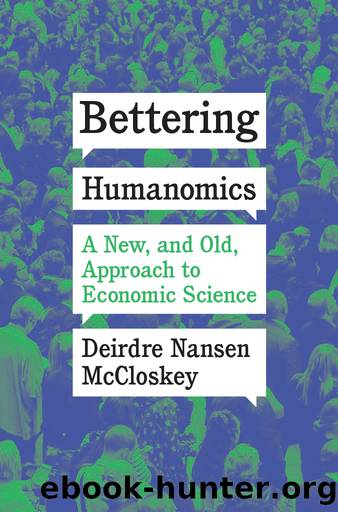Bettering Humanomics by Deirdre Nansen McCloskey;

Author:Deirdre Nansen McCloskey; [McCloskey, Deirdre Nansen]
Language: eng
Format: epub
Tags: BUS000000 Business & Economics / General, BUS023000 Business & Economics / Economic History, BUS069030 Business & Economics / Economics / Theory, BUS039000 Business & Economics / Economics / Macroeconomics
Publisher: University of Chicago Press
Published: 2021-05-06T00:00:00+00:00
The judges often declined to support the restrictiveness that the guilds sought to impose. . . . As early as the start of seventeenth century, towns had been losing cases they took to court with the aim of compelling new arrivals to join their craft guilds. . . . A key case concerned Newbury and Ipswich in 1616. The ruling in this instance became a common law precedent, to the effect that âforeignersâ, men from outside a borough, could not be compelled to enrol.18
Ringmar devotes 150 lucid and learned and literate pages to exploring the origins of European science, humanism, newspapers, universities, academies, theater, novels, corporations, property rights, insurance, Dutch finance, diversity, states, politeness, civil rights, political parties, and economics. But he is a true comparativist (he taught for some years in China)âthis in sharp contrast to some of the other Northians, and especially the good, much missed Douglass North himself. So Ringmar does not suppose that the European facts speak for themselves. In the following one hundred even better pages he takes back much of the implicit claim that Europe was anciently special, whether âinstitutionalizedâ or not, by going through for China the same triad of reflection, entrepreneurship, and pluralism/toleration and finding them pretty good. âThe Chinese were at least as intrepid [in the seas] as the Europeansâ; âthe [Chinese] imperial state constituted next to no threat to the property rights of merchants and investorsâ; âalready by 400 BCE China produced as much cast iron as Europe would in 1750â; Confucianism was âa wonderfully flexible doctrineâ; âChina was far more thoroughly commercializedâ; European âsalons and coffee shops [were] . . . in some ways strikingly Chinese.â19 He knows, as the Northians appear not to, that China had banks and canals and large and specialized firms and private property many centuries before the Northian date for the acquisition of such modernities in Englandâthe end of the seventeenth century.
The economist and historian Sheilagh Ogilvie criticizes the neoinstitutionalists and their claims that efficiency ruled, arguing on the contrary for a âconflictualâ point of view in which power is taken seriously:
Download
This site does not store any files on its server. We only index and link to content provided by other sites. Please contact the content providers to delete copyright contents if any and email us, we'll remove relevant links or contents immediately.
International Integration of the Brazilian Economy by Elias C. Grivoyannis(106931)
The Radium Girls by Kate Moore(12003)
Turbulence by E. J. Noyes(8008)
Nudge - Improving Decisions about Health, Wealth, and Happiness by Thaler Sunstein(7678)
The Black Swan by Nassim Nicholas Taleb(7087)
Rich Dad Poor Dad by Robert T. Kiyosaki(6576)
Pioneering Portfolio Management by David F. Swensen(6275)
Man-made Catastrophes and Risk Information Concealment by Dmitry Chernov & Didier Sornette(5981)
Zero to One by Peter Thiel(5767)
Secrecy World by Jake Bernstein(4727)
Millionaire: The Philanderer, Gambler, and Duelist Who Invented Modern Finance by Janet Gleeson(4448)
The Age of Surveillance Capitalism by Shoshana Zuboff(4267)
Skin in the Game by Nassim Nicholas Taleb(4224)
The Money Culture by Michael Lewis(4174)
Bullshit Jobs by David Graeber(4162)
Skin in the Game: Hidden Asymmetries in Daily Life by Nassim Nicholas Taleb(3973)
The Dhandho Investor by Mohnish Pabrai(3744)
The Wisdom of Finance by Mihir Desai(3720)
Blockchain Basics by Daniel Drescher(3565)
